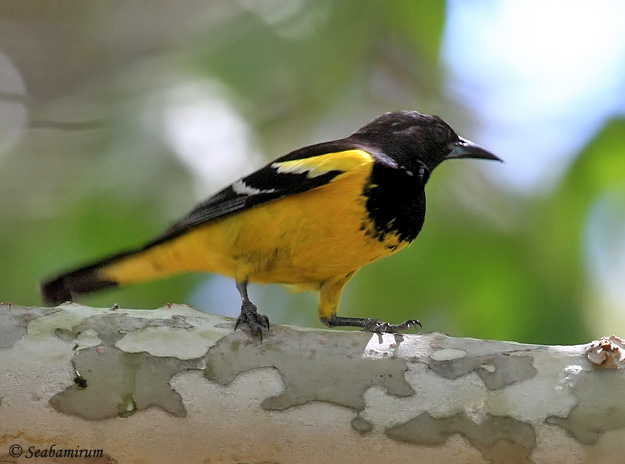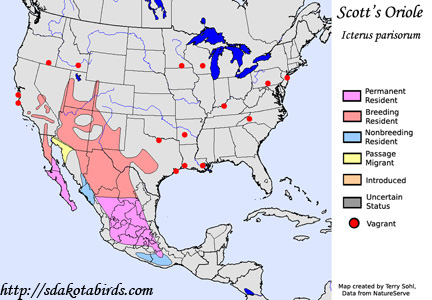| Length: 9 inches | Wingspan: 12.5 inches | Seasonality: Non-resident in South Dakota |
| ID Keys: Males black head and breast, black wings with yellow coverts and white wing-bar, yellow underparts and base of tail | ||
 The
Scott's Oriole is an oriole of the American southwest and Mexico, where they
frequently nest in yuccas, but also can be found in a variety of other dry,
semi-open habitats. They are most similar in appearance to Audubon's Oriole,
but the ranges of the two species do not overlap. The yellowish
overall coloring and extensive black on the head, chest, and back separate
the Scott's Oriole from other oriole species found in the same range.
The
Scott's Oriole is an oriole of the American southwest and Mexico, where they
frequently nest in yuccas, but also can be found in a variety of other dry,
semi-open habitats. They are most similar in appearance to Audubon's Oriole,
but the ranges of the two species do not overlap. The yellowish
overall coloring and extensive black on the head, chest, and back separate
the Scott's Oriole from other oriole species found in the same range.
Habitat: Found in a variety of semi-open habitats in semi-arid areas of the southwestern U.S. and western Mexico. They can be found in open woodlands of pinyon and juniper, in dry areas with scattered oases of palms and other trees, along riparian areas, and in stands of Joshua-trees.
Diet: Feeds on insects and spiders, as well as a variety of fruits and berries. They will also feed on nectar.
Behavior: Feeds by deliberately climbing through vegetation as it searches for insects, usually foraging a low to moderate heights. They will also sometimes forage on the ground. Scott's Orioles will also pierce flowers to retrieve nectar, and visit feeders for nectar and fruit.
Nesting: The nest is a hanging basket woven of grasses, hair, plant stems, and other thin fibrous plant material. It is placed in a tree, yucca, or Joshua tree, usually around 5 to 25 feet from the ground. The female alone incubates the eggs, with an incubation period of about 2 weeks. Both parents feed and tend to the young after they hatch.
Song: The song of a Scott's Oriole is a series of rich, low, bubbling whistles. They also have multiple, short, harsh calls.
Migration: Some Scott's Orioles in Mexico are likely permanent residents, but most are strongly migratory. In the U.S. portion of their range, most migrate to Mexico for the winter, but a handful may overwinter in southern California and Arizona.
Interactive eBird map: Click here to access an interactive eBird map of Scott's Oriole sightings
Similar Species: Audubon's Oriole, Hooded Oriole, Streak-backed Oriole
Feeders: Scott's Orioles will visit feeders for offered fruit, and will visit hummingbird feeders for nectar.
Conservation Status: Populations of the Scott's Oriole are stable or even increasing, and they are still found over a wide geographic range. The IUCN lists the Scott's Oriole as a species of "Least Concern".
Further Information: 1) WhatBird - Scott's Oriole
2) Audubon Guide - Scott's Oriole
3) BirdWeb - Scott's Oriole
Photo Information: Photo taken by Seabarium - Photo licensed under Creative Commons Attribution 2.0 Generic License.
| Click below for a higher-resolution map |
 |
| South Dakota Status: Non-resident in South Dakota |
Additional Scott's Oriole Photos (coming soon!!)
